Uvalde response to mass shooting was ‘abject failure’ that put lives of officers above children, hearing told
Steve McCraw, director of the Texas Department of Public Safety, gave damning testimony on Tuesday morning saying that ‘terrible decisions were made’ by Uvalde School District Police Chief Pete Arredondo
Your support helps us to tell the story
From reproductive rights to climate change to Big Tech, The Independent is on the ground when the story is developing. Whether it's investigating the financials of Elon Musk's pro-Trump PAC or producing our latest documentary, 'The A Word', which shines a light on the American women fighting for reproductive rights, we know how important it is to parse out the facts from the messaging.
At such a critical moment in US history, we need reporters on the ground. Your donation allows us to keep sending journalists to speak to both sides of the story.
The Independent is trusted by Americans across the entire political spectrum. And unlike many other quality news outlets, we choose not to lock Americans out of our reporting and analysis with paywalls. We believe quality journalism should be available to everyone, paid for by those who can afford it.
Your support makes all the difference.The law enforcement response to the Uvalde mass shooting was an “abject failure” where the police chief “put the lives of officers above the lives of children”, an official said at the first Texas Senate public hearing about the massacre.
Steve McCraw, director of the Texas Department of Public Safety (TDPS), gave damning testimony on Tuesday morning as officials piece together the events surrounding the slaughter of 19 children and two teachers at Robb Elementary School last month.
“We do know this: there is compelling evidence that the law enforcement response was an abject failure and antithetical to everything we have learned over the past two decades since Columbine,” he said.
Mr McCraw levelled the blame at Uvalde School District Police Chief Pete Arredondo, the officer in charge of the law enforcement response, accusing him of being the “only thing” stopping officers entering the classroom and bringing an end to the active shooting situation – something that could have been done just three minutes into the massacre.
“Three minutes after the subject entered the west hallway, there was sufficient number of armed officers wearing body armour, to isolate distract and neutralise the subject,” he said.
“The only thing stopping a hallway of dedicated officers from entering room 111 and 112 was the on-scene commander, who decided to place the lives of officers before the lives of children.
“The officers had weapons. The children had none. The officers had body armour. The children had none.
“The officers had training. The subject had none.”
Mr McCraw, who is leading a state investigation into the law enforcement response, said that Chief Arredondo waited for radios, firearms and keys rather than send officers into the two adjoining classrooms where dying students and teachers were waiting to be saved.
“One hour, 14 minutes and eight seconds. That’s how long the children waited and the teachers waited in rooms 111 to be rescued,” he said.
“And while they waited, the on-scene commander waited for radios and rifles. Then he waited for shields. Then he waited for SWAT.
“Lastly, he waited for key that was never needed.”
The TDPS director said that protocol put in place after the 1999 Columbine high school massacre in Colorado to “stop the killing, stop the dying” was “clear and compelling” – but was not followed on 24 May.
“Terrible decisions were made by the on-site commander,” he said, adding that “this set our profession back a decade.”
Mr McCraw went on to provide the most detailed timeline to date about the events that day, explaining what officers were doing in the 77-minute gap between the gunman Salvador Ramos entering the school and opening fire on his victims at 11.33am and a Border Patrol unit entering the classroom and shooting him dead at 12.50pm.
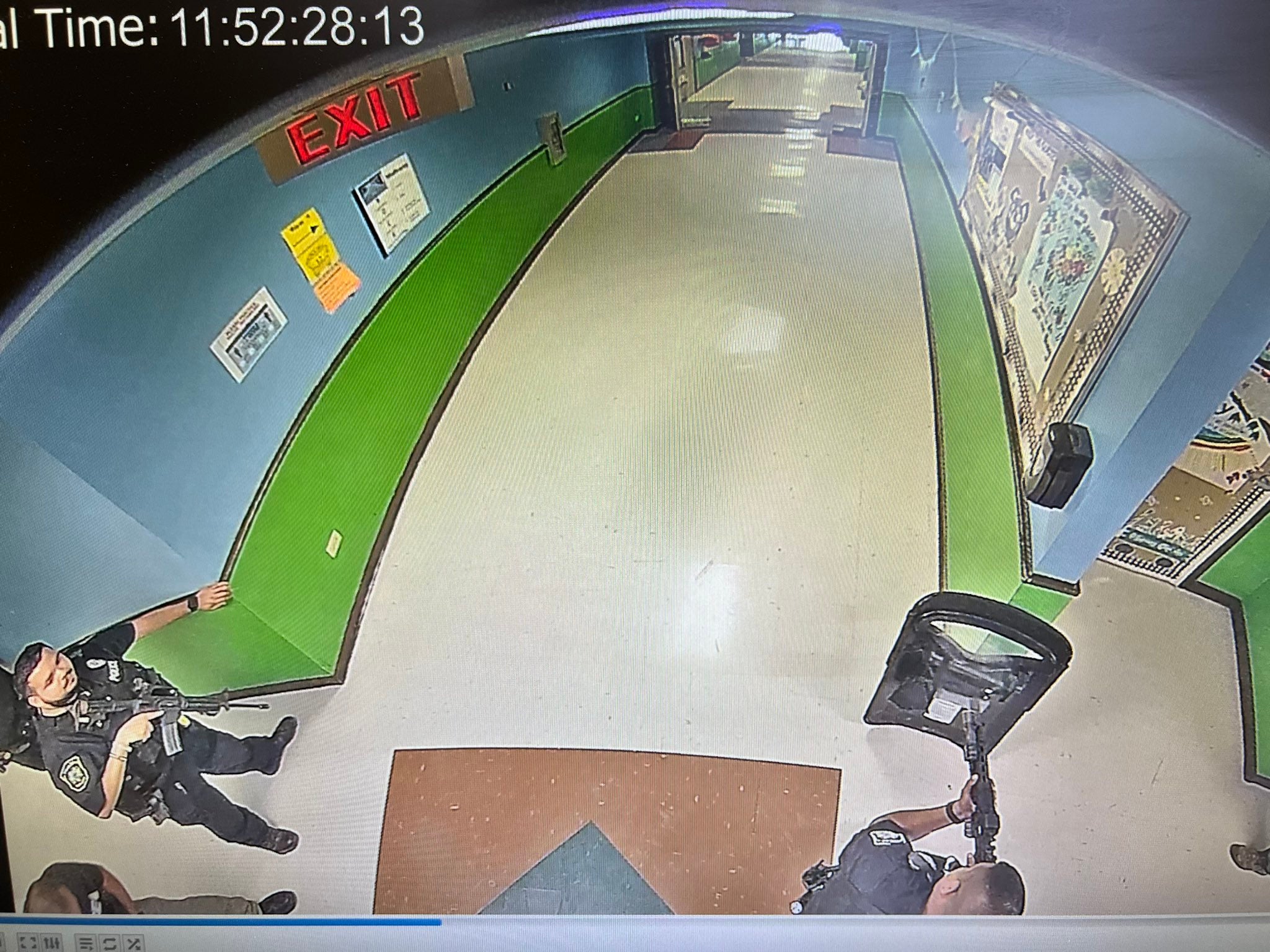
Shocking new details came to light including that, within just three minutes of Ramos opening fire in the school, officers armed with rifles and pistols and wearing protective vests had arrived outside the classroom.
Minutes later – at 11.40am – Chief Arredondo told a police dispatcher that officers needed “more firepower” to be able to enter.
“We don’t have enough firepower. I need more firepower,” he said, per the transcript.
Then, 19 minutes after the shooting began, officers were “diverted to crowd control” of parents outside the school – instead of entering the two adjoining classrooms where Ramos was holed up with dying students and teachers.
A staggering one hour, 14 minutes and eight seconds passed between the start of the shooting and when law enforcement finally entered the classroom and brought the ongoing massacre to an end.
“In an active shooter environment, that’s intolerable,” Mr McCraw testified of the delay.
He pushed back on the on-site commander’s claims that he needed additional resources to send officers inside, saying that just one officer with a gun is enough to try to tackle an active shooter situation.
“You don’t wait for a SWAT team. If you have one officer that’s enough,” he said.
“You stop the killing and you stop the dying. That is preached and practiced in the state of Texas. It just wasn’t implemented.”
He said multiple times that officers should not wait for additional resources or for a shield in an active shooting situation, but – under protocol – must “immediately engage the shooter”.
Instead, a large chunk of time was spent waiting for a key to the classroom door when it is believed to have already been unlocked, he said.
Mr McCraw testified that the door to the classroom appears to have been unlocked during the entire massacre but, according to surveillance footage from the hallway, none of the officers even tried the door handle.
Ramos first managed to enter Robb Elementary School through an unlocked door at the west side of the building.
The door had been propped open with a rock by a teacher, said Mr McCraw.
However, the same teacher removed the rock and closed the door after she saw the gunman heading to the school.
The door should have automatically locked but – for an unclear reason – it did not do so.
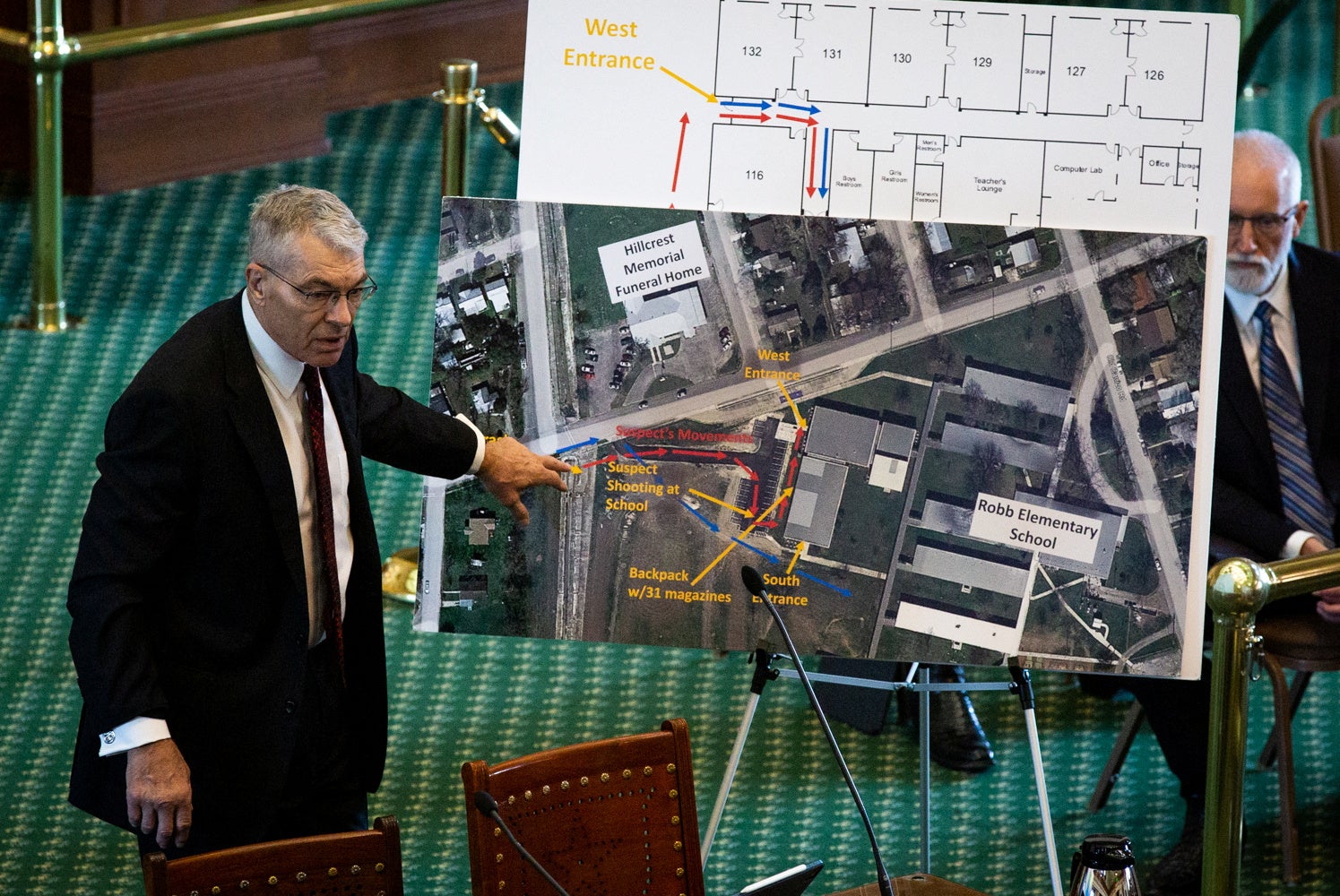
Previously, officials had accused the teacher – who was actually the one who placed the school into lockdown – of leaving the door propped open.
“It was closed, but unlocked,” McCraw said, adding that Ramos was able to “walk straight through it”.
“I don’t believe based on the information we had right now that the door was ever secured,” he said.
There was no way for the teacher to know if the door had automatically locked from the inside, he said.
“The only way to know that the door is unlocked is to go out, close the door, then try it,” he said.
Once inside the building, Ramos was then also able to enter the classroom, exit back into the hallway and reenter “seamlessly” and without a key.
Surveillance footage from inside the corridor outside the classroom reveals that no officers tried the door.
“I don’t believe based on the information we had right now that the door was ever secured,” said the TDPS director.
He added that even if the door had been locked, there was still “no need to wait for a key” as officers could have breached the door with a tool or have entered the room through the windows.
The damning testimony comes after Chief Arredondo previously blamed the delayed response on him being unable to get through the locked door and needing to wait for a key to get inside.
Chief Arredondo broke his silence in an interview with The Texas Tribune last week, claiming the classroom was locked and that he spent much of the time trying to find the right keys to enter the room.
He said he had called for keys to the room and a custodian turned up with a large key ring, containing dozens of keys which he tried to use to enter.
New details were also revealed about the missed opportunity by a school security officer to engage the gunman outside the school, revealing that they mistook a teacher for the suspect.
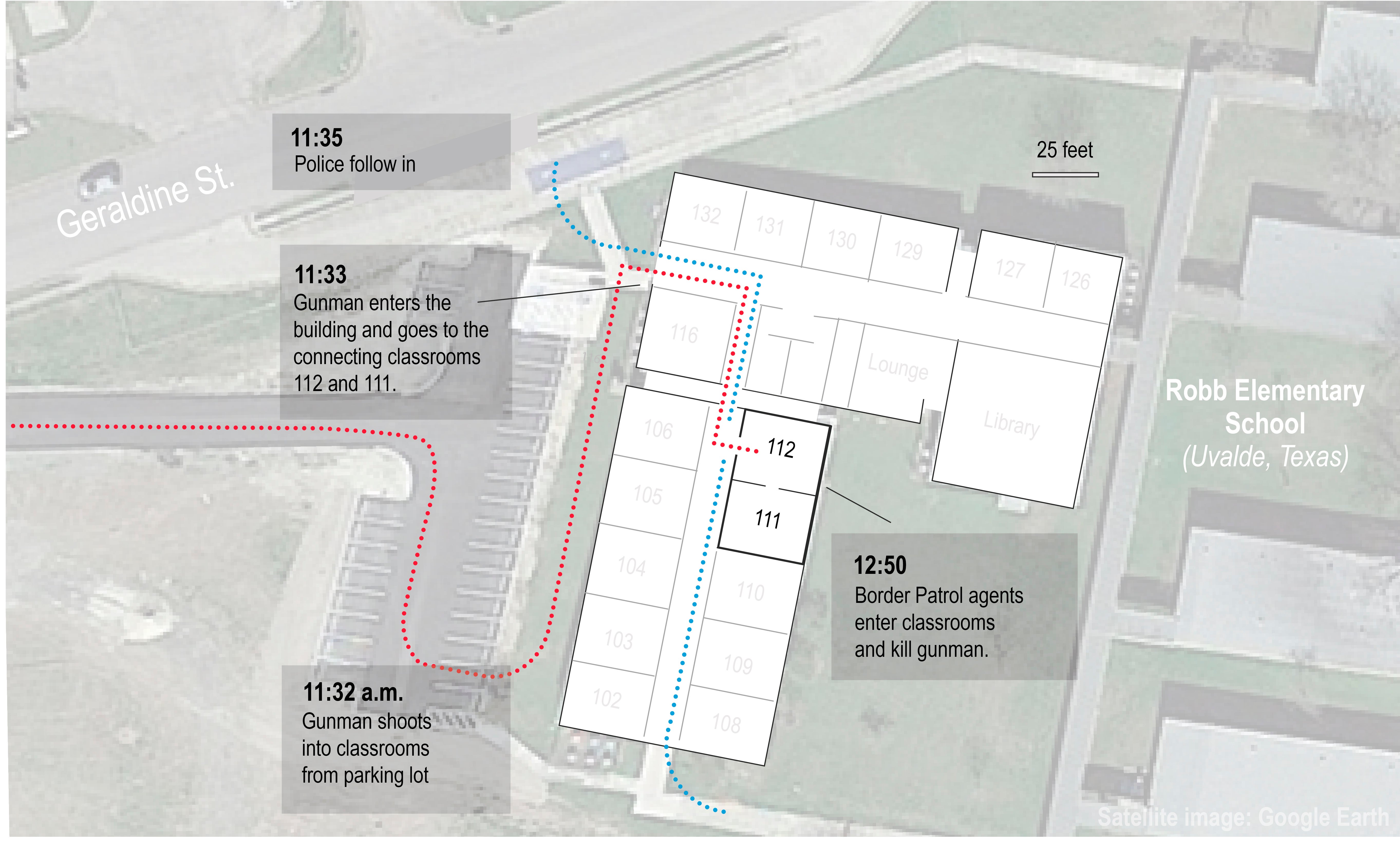
The officer – after hearing that there was a gunman at the school – drove to the building but accidentally drove past Ramos.
Mr McCraw testified that the officer had spotted a teacher in the grounds of the school and mistook them for the shooter.
The officer then drove towards the shooter, relaying that they had found the suspect – while driving past the real perpetrator.
During his almost five hours of testimony, Mr McCraw spoke about the warning signs displayed by the shooter in the lead-up to the massacre.
In the eight months before the shooting, Ramos embarked on “a pathway to violence”, he said – buying rifle accessories and asking a family member to buy him a firearm when he was 17.
After turning 18, the suspect then purchased two firearms and ammunition.
He also made disturbing statements online.
However, the TDPS director said that the investigation had found no reports to law enforcement or to schools about Ramos’ disturbing behaviour such as animal cruelty prior to the attack.
The hearing comes as questions continue to mount over the law enforcement response to the mass shooting, with a delay in officers entering the classroom and killing the gunman now believed to have cost lives.
In total, law enforcement officers waited 77 minutes from the time the shooting started inside the school at 11.33am before a Border Patrol tactical unit stormed the classroom and shot Ramos dead at 12.50pm.
The city of Uvalde and its police department have stopped releasing information about the shooting to the public and are fighting public records requests made by several media organisations for the likes of 911 calls and bodycam footage.
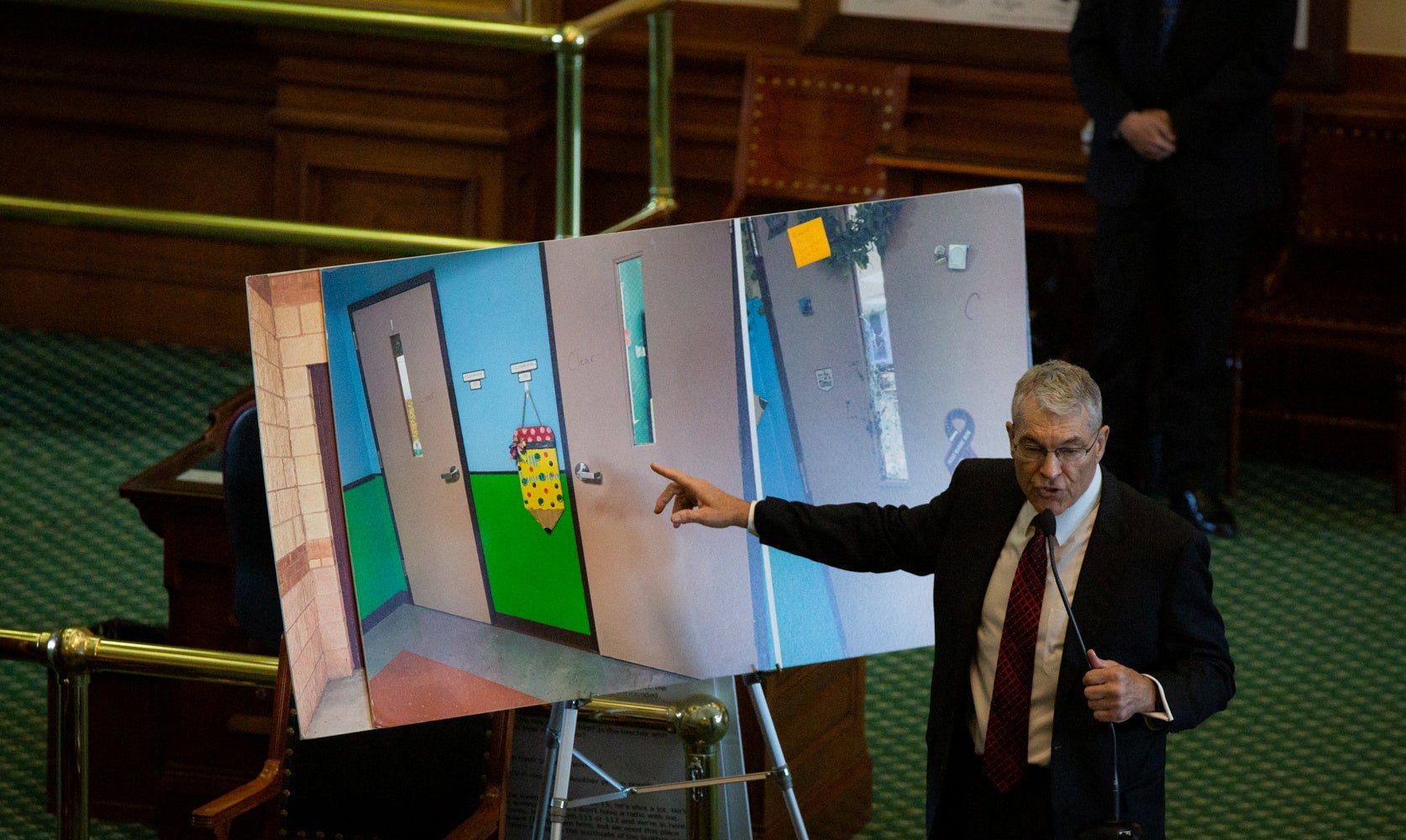
During the one hour and 17 minute delay, terrified students called 911 from inside the room at least seven times while desperate parents outside tried to storm the building themselves after growing irate with the police delay.
The significant time lapse may well have cost lives as it emerged that more than a dozen of the 33 children and three teachers trapped inside the two adjoining classrooms were still alive during that time.
One teacher died in an ambulance on the way to hospital while three of the children died after reaching hospitals.
The special Texas Senate committee – Senate Special Committee to Protect All Texans – has been tasked to probe the events of the 24 May massacre and make legislative recommendations to the state.
Eight Republican and three Democratic state senators sit on the committee.
Notably absent from the committee is Democratic state Sen Roland Gutierrez, whose district covers Uvalde.
Sen Gutierrez has hit out at the police response to the mass shooting and called for the state to pass tighter gun control measures.
He spoke during opening statements at Tuesday’s hearing where he broke down in tears telling his fellow lawmakers that he “saw seven baby girls in their coffins” at the victims’ fiunerals and comforted families of the victims and survivors.
“I’ve heard the most gruesome stories from little kids,” he said of the surviving children who saw their friends and teachers die.
The Democrat described the moment that some parents learned that their children had been killed in the massacre, remembering how he heard mothers and fathers let out “sounds that were not like normal screams or normal crying”.
The next Senate committee hearing will take place on Wednesday.
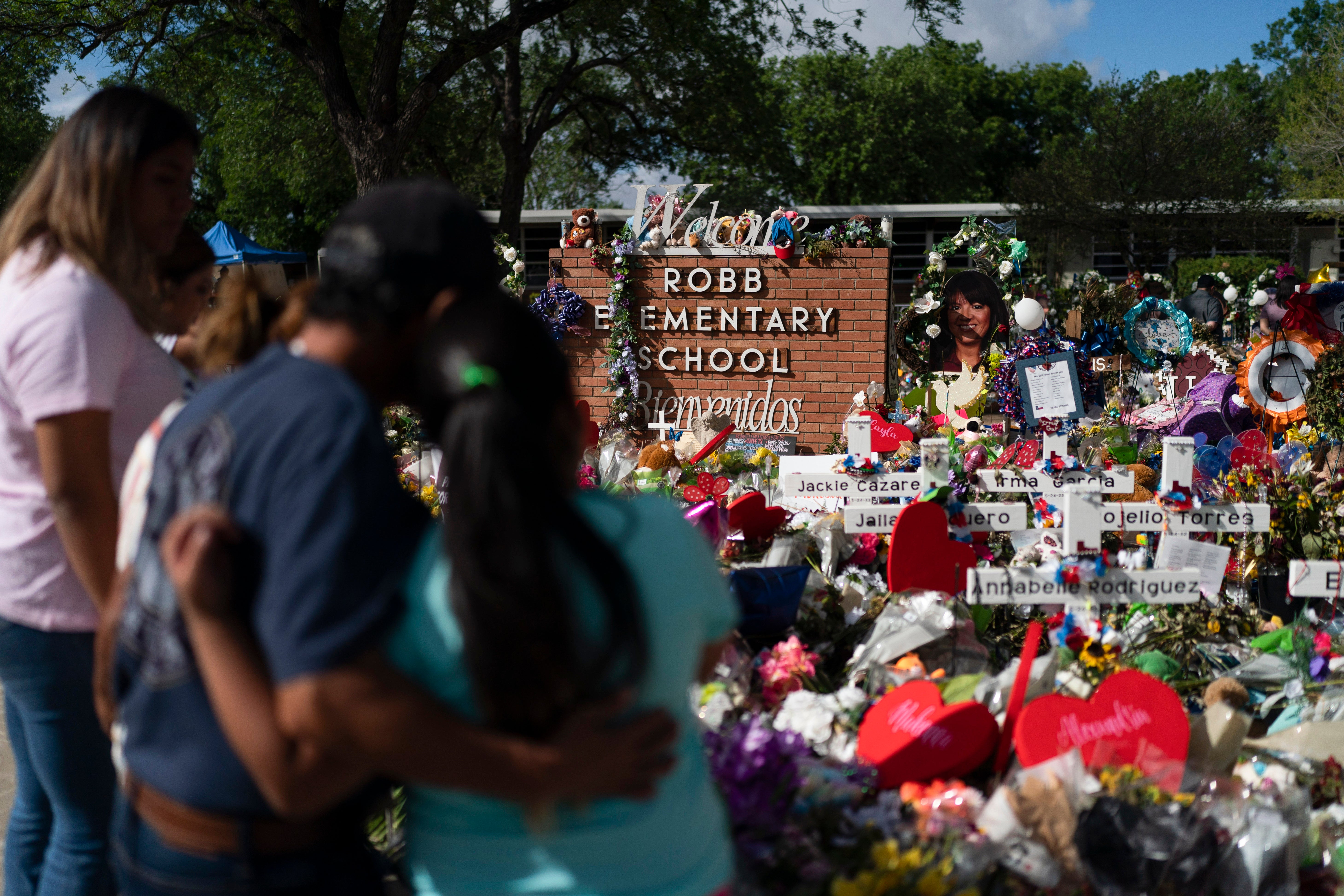
At least two other separate investigations have been launched by the Texas Rangers and the US Justice Department.
On a national level, the massacre of 21 innocent people in Uvalde has led to renewed debate over gun control in Congress.
Last week, a bipartisan group of senators said they had reached a deal on a package of narrow gun safety measures.
The deal includes expanding background checks for people aged 18 to 21 and more money for school safety and mental health resources.
However, it does not include the ban on assault weapons that many are calling for, after high-capacity rifles were used in the recent attacks to kill multiple people.
The massacre at Uvalde came just 10 days after 10 Black people were shot dead by a self-proclaimed white supremacist in a grocery store in Buffalo, New York.
In both shootings, the 18-year-old suspects used semi-automatic rifles.




Join our commenting forum
Join thought-provoking conversations, follow other Independent readers and see their replies
Comments